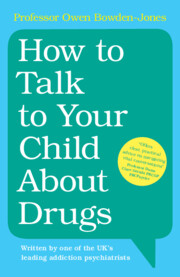Book contents
- How to Talk to Your Child About Drugs
- How to Talk to Your Child About Drugs
- Copyright page
- Contents
- Acknowledgements
- Introduction
- 1 What Are Psychoactive Drugs, Who Uses Them and Why?
- 2 Understanding Adolescence
- 3 Having the Drug Conversation with Your Child
- 4 Drugs and the Brain
- 5 How Do Drugs Cause Harm?
- 6 Types of Drugs
- 7 Rise of the Synthetics
- 8 Legal but Harmful: Prescription Medications, Tobacco, Vaping and Alcohol
- 9 Behavioural Addictions
- 10 Detecting Drug Use and What to Do about It
- 11 Treatment and Recovery
- 12 Final Thoughts
- Useful Resources
- References
- Index
9 - Behavioural Addictions
Published online by Cambridge University Press: 13 February 2025
- How to Talk to Your Child About Drugs
- How to Talk to Your Child About Drugs
- Copyright page
- Contents
- Acknowledgements
- Introduction
- 1 What Are Psychoactive Drugs, Who Uses Them and Why?
- 2 Understanding Adolescence
- 3 Having the Drug Conversation with Your Child
- 4 Drugs and the Brain
- 5 How Do Drugs Cause Harm?
- 6 Types of Drugs
- 7 Rise of the Synthetics
- 8 Legal but Harmful: Prescription Medications, Tobacco, Vaping and Alcohol
- 9 Behavioural Addictions
- 10 Detecting Drug Use and What to Do about It
- 11 Treatment and Recovery
- 12 Final Thoughts
- Useful Resources
- References
- Index
Summary
Clinical symptoms and brain changes seen in substance use disorders have also been observed in particular behaviours, leading to the concept of ‘behavioural addiction’.
Gambling disorder and gaming disorder are now classified by the World Health Organisation alongside substance use disorders
In the future other behaviours, such as harmful use of internet pornography, may join gaming and gambling disorders.
Like substance use disorders, behavioural addictions can lead to harms for the individual including worsening mental health, social function and academic performance.
Relatives, friends and others can also suffer consequences of behavioural addictions such as financial loss (with gambling disorder) and deteriorating relationships.
The evidence on how best to treat behavioural addiction are still building, but approaches used for substance use disorders are typically recommended.
- Type
- Chapter
- Information
- How to Talk to Your Child About Drugs , pp. 182 - 195Publisher: Cambridge University PressPrint publication year: 2025

